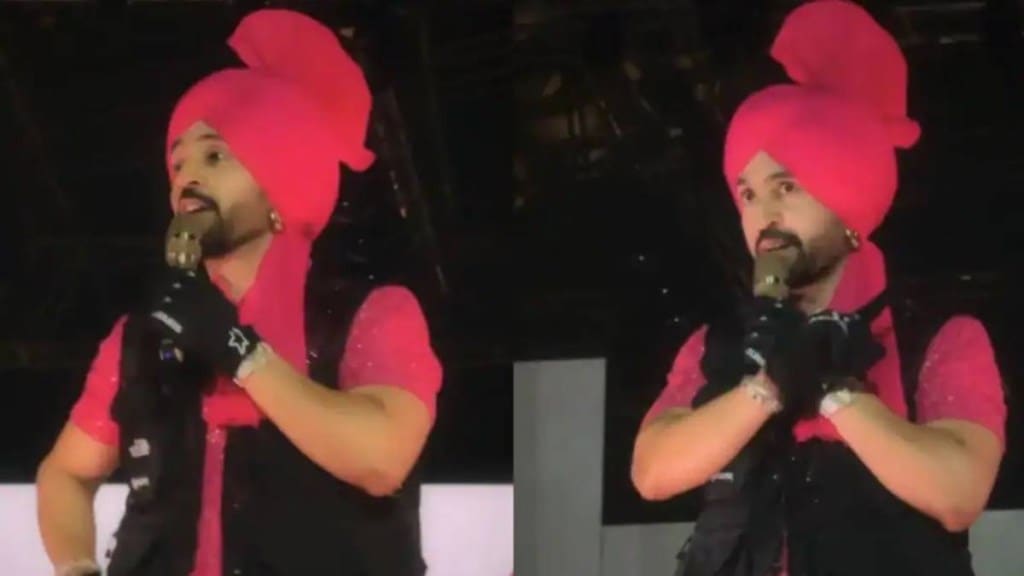Renowned singer and actor Diljit Dosanjh is known for his unfiltered opinions, and during a recent concert in Ahmedabad, he made headlines once again with a bold statement regarding the ongoing debate about promoting alcohol in songs. The artist, who is currently on his Dil-Luminati India Tour, addressed calls from various government bodies, including the Telangana government, to stop promoting alcohol, drugs, and violence in his music. But Dosanjh didn’t hold back—he issued a challenge to the authorities, calling for nationwide action on alcohol if they wanted him to stop singing songs about it.
Diljit’s Challenge: A Call for Nationwide Liquor Ban
Diljit Dosanjh’s fiery remarks came after the Telangana government directed him not to promote alcohol or drugs in his songs, ahead of his scheduled performance in Hyderabad. The directive was in line with the state’s policy to curb the promotion of harmful substances in public events. However, the singer turned the tables on the authorities by setting a stark condition.
“Here’s the good news. I didn’t get any notice today,” Diljit announced to his fans in Ahmedabad. “Even today, I won’t sing any song about alcohol. It’s because Gujarat is a dry state,” he continued, referencing Gujarat’s prohibition laws that ban the sale of alcohol. While many in the crowd reacted with surprise, Dosanjh cleverly used the opportunity to make a larger point about the hypocrisy surrounding alcohol consumption policies in India.
The singer challenged the authorities by stating, “If all the states in the country close liquor shops, I will stop singing songs about alcohol.” He emphasized that during the COVID-19 pandemic, liquor stores were among the few businesses that remained open while many others were shut down. This, according to Diljit, was an example of the double standards that exist when it comes to alcohol and its consumption in the country.
The Double Standards in Alcohol Regulation
Diljit’s comments come amidst growing concern over the glamorization of alcohol in pop culture, particularly in Bollywood and the music industry. While the Telangana government, and now Gujarat, have asked artists to refrain from singing about alcohol, they haven’t taken similar action against the widespread presence of alcohol advertisements in mainstream media.
“I can tweak the lyrics of my songs very easily. But let’s be clear, I’m not a new artist. I know how to handle these things,” he remarked, addressing the idea that his music might have an outsized influence on young people. Diljit then turned the conversation towards Bollywood, where he pointed out that alcohol-themed songs are a staple in the music and film industries.
“Bollywood has thousands of songs about alcohol. I have only a few,” Diljit said, referencing tracks like “Patiala Peg.” He noted that despite his own limited repertoire of alcohol-related songs, his music is often singled out while similar content in mainstream Bollywood cinema goes unchecked.
Diljit made it clear that, unlike many of his Bollywood counterparts, he does not endorse alcohol in real life. “I don’t drink alcohol, and I won’t promote it in my songs. Bollywood stars can advertise alcohol, but Diljit Dosanjh doesn’t,” he stated, drawing a stark contrast between himself and other celebrities.
A Call for Prohibition and Social Change
Taking a more dramatic turn, Diljit suggested a movement to ban alcohol across the country. “Let’s start a movement,” he declared. “If all states declare themselves as dry states, from the next day, Diljit Dosanjh will stop singing songs about alcohol in live concerts.” He further challenged local governments by offering a simple solution: “Declare a dry day in whichever place I perform, and I won’t sing any songs about alcohol.”
Diljit’s call for a nationwide ban on alcohol is both a critique of government policies and a reflection of his personal stance on the issue. By offering a solution that would allow his music to evolve with social change, he presents himself as someone willing to engage in larger cultural conversations rather than just entertain. The singer’s passionate speech also hinted at a desire for a more consistent and thoughtful approach to alcohol regulation—one that does not just target artists but addresses the broader societal issues related to substance use.
The Bigger Picture: The Role of Art in Society
Diljit Dosanjh’s comments come at a time when the influence of music, film, and media is under increasing scrutiny. Many artists, like Dosanjh, are finding themselves at the crossroads of entertainment and social responsibility. However, Diljit’s stance reveals the complexity of the situation: while he acknowledges the power of his platform, he also recognizes the importance of creative freedom and the right to challenge social norms.
By tweaking the lyrics of his songs rather than simply complying with censorship, Diljit has shown that artists can retain control over their art while still responding to societal concerns. He also highlighted how important it is for the public and governments to hold larger institutions accountable—especially those that profit from promoting substances like alcohol.
Diljit Dosanjh’s remarks in Ahmedabad are a powerful reminder that the relationship between art, politics, and culture is never straightforward. Through his challenge to the authorities, he has called attention to the inconsistencies in how alcohol is treated across India. Whether or not the country will heed his call for a national alcohol ban remains to be seen, but one thing is clear: Diljit Dosanjh is unafraid to use his voice to spark a much-needed conversation about the role of artists in shaping society.
As his Dil-Luminati India Tour continues, audiences are likely to see more of this bold side of Diljit—an artist who is not just here to perform, but to challenge, question, and inspire change.

